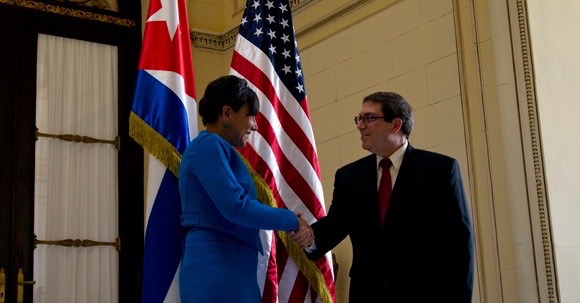
Cuba-U.S.: A normalization is plausible and desirable
An editorial in La Jornada
Visiting Havana, U.S. Secretary of Commerce Penny Pritzker said yesterday (Sept. 7) that the governments of Cuba and the United States are in a position to build a wider relationship.
She said that Washington wants to help all Cubans to join the global economy and enjoy a better standard of living and also allow the people of the United States an opportunity to learn about Cuba and develop relations with the inhabitants of an island merely 90 miles from the shores of the world’s largest economy.
Those words were spoken in the context of the inauguration of an encounter between Cuban and U.S. government officials that is now proceeding on the island.
In response, the Cuban minister of Foreign Trade and Investment, Rodrigo Malmierca, said that his government very much appreciates the measures that President Obama has taken to somehow loosen up the grip of the blockade.
The encounter and those pronouncements indicate a rapprochement between the authorities of both countries that would have been unimaginable some months ago and is evidenced by a slow but firm reactivation of the economic relations and exchanges between the United States and Cuba.
Only last week, Baltimore-Washington International Airport joined 18 other U.S. terminals that host direct charter flights to the island. A day before, the authorities of both countries celebrated in Havana the first round of negotiations on civil aviation, with a view to reestablish regular commercial flights, suspended half a century ago.
That perspective is healthy in that it aims to break an economic and commercial isolation that has been, for many decades, rejected by practically the entire international community; that has meant to Cubans an unjustifiable, inhumane and sterile punishment; and whose persistence is otherwise obsolete (it was a determination made in the context of a geostrategic and ideological conflict that is now over) in political and economic terms.
After all, the persistence of that measure is a contradiction to the principles of free trade that Washington has imposed elsewhere in the continent and the world, inasmuch as it deprives U.S. and foreign companies of legitimate opportunities for business and investment in the Cuban economy. To top it all off, the embargo implies an inadmissible effect of extraterritoriality by the U.S. laws.
While acknowledging that the embargo is based on a complex legislative scaffolding whose modification is up to the U.S. Congress (controlled by a Republican majority), we need to recognize that events like yesterday’s are steps on the right direction for the full reestablishment of relations.
They also serve as a way to correct a historic injustice that has caused enormous harm to the Cuban people.
In addition, it is pertinent and necessary for the insertion of Cuba in the international economy — to which the U.S. Commerce secretary referred yesterday — to take place in harmony with the model chosen by the Cubans themselves, not on terms imposed by Washington.
That notion of basic respect for national sovereignty is a central factor so the policy of normalization of the bilateral relations, initiated by Obama and Castro and facilitated by Pope Francis, may have chances of success at medium and long ranges.
(Taken from the Mexican newspaper La Jornada)
[Photo at top of Cuba Foreign Minister Bruno Rodriguez greeting Secretary of Commerce Penny Pritzker in Havana. Photo by Ladyrene Pérez/ Cubadebate.]

